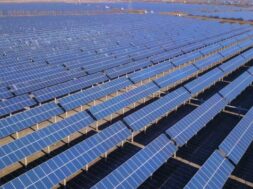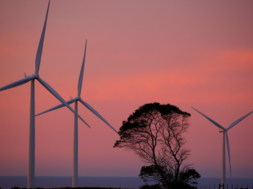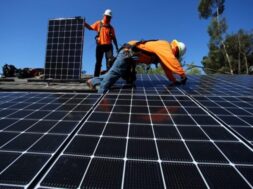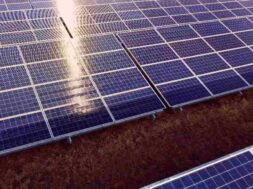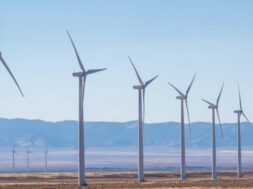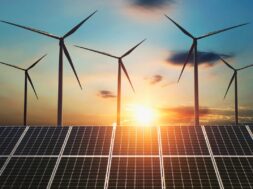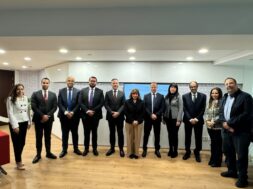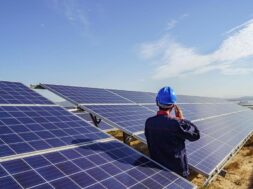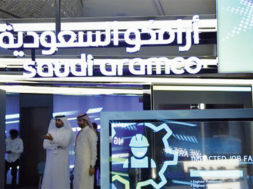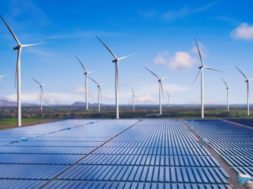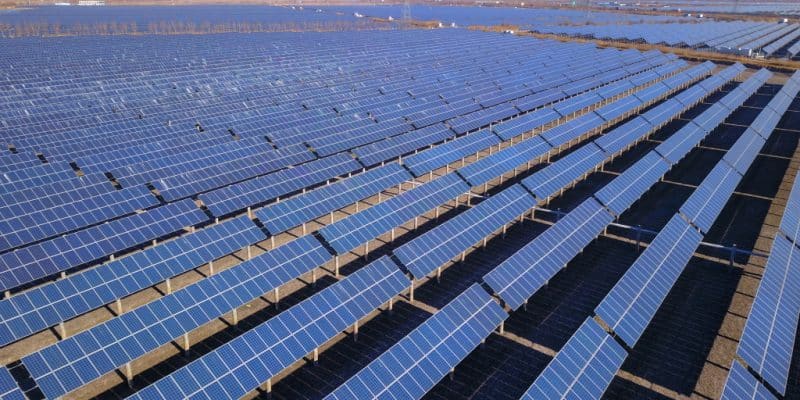
Low tax revenues, high-interest loans, and superpower squabbling over debt relief have made matters worse for African governments.
Welcome to Foreign Policy’s Africa Brief.
The highlights this week: Italy and Libya sign a gas deal, taking offense at Germany’s Twitter emojis, and the United Arab Emirates’ solar power cooperation with Zambia.
Africa’s Debt Problem
U.S. Treasury Secretary Janet Yellen and Kristalina Georgieva, managing director of the International Monetary Fund (IMF), made separate visits to African countries last week, as some African governments look to restructure their debt.
The two finance officials both visited Zambia, which became the continent’s first pandemic-era defaulter on foreign debt in 2020 (an estimated $17 billion, mainly accrued under former President Edgar Lungu and blamed on corruption and state mismanagement). China was the country’s largest-single creditor.
Beijing signed up to a coordinated restructuring of Zambia’s debt under a G-20 framework but has been blamed for slow progress because it reportedly wants foreign holders of local currency debt included in debt treatments.
Speaking in the Zambian capital of Lusaka, Yellen said she had raised Zambia’s debt issue when she met Chinese Vice Premier Liu He two weeks ago and asked for “cooperation in trying to reach a speedy resolution.” She added, “I know the Chinese have been a barrier to concluding the negotiations.”
The Chinese Embassy in Zambia hit back in a statement suggesting that the biggest contribution the United States can make is to solve its “own domestic debt problem,” which is “now worsening the world’s economic and financial stability,” referring to U.S. national debt at $31.5 trillion.
Despite the tense exchange of words, Zambian President Hakainde Hichilema said he hoped a restructuring deal could be hammered out by the first quarter of this year so the country can attract investment. Although China is the nation’s largest creditor, private lenders based in the West make up the vast proportion of Zambia’s debt, and those lenders are not part of the voluntary G-20 framework and have not agreed to cuts. Amid protracted negotiations, Zambia cannot yet access an agreed $1.3 billion IMF bailout.
Low tax collection. According to a United Nations Development Programme report, 24 of the 54 lower-income countries at high risk of debt distress are in Africa, including the two biggest economies on the continent, Nigeria and Egypt. Cairo struck a $3 billion bailout package with the IMF last November. The report blamed vulnerabilities on primary balance deficits—how much a government spends versus how much it collects in taxes.
Ghana last month suspended payments on most of its external debt, becoming the third African country to default since the start of the pandemic. “Our revenue from taxes is about 12 percent of GDP, which is even lower than the sub-Saharan average, which is about 15 percent,” said John Asafu-Adjaye of the Accra-based think tank African Center for Economic Transformation, despite recent efforts to raise domestic taxes through a widely unpopular digital levy.
But Asafu-Adjaye also blames a lack of access to capital markets. Ghana moved from being a lower-income country to a lower-middle-income country, which meant it was not eligible for soft loans and grants. “That’s why countries like Ghana have such poor [luck] on the capital markets sometimes going in for high loans,” Asafu-Adjaye said. There are 12 African countries in this situation, estimates Asafu-Adjaye, including Zambia. (Although the World Bank has now reclassified Zambia as low income for the 2023 financial year.)
High interest loans. The U.S. dollar is the strongest it has been in two decades, which has squeezed lower-income nations that are reliant on oil imports and borrow in dollars to fund state services—often at exceptionally high interest rates.
The United States and United Kingdom until recently could borrow at less than 1 percent interest, whereas private lenders have charged countries in Africa between 7 to 10 percent, explained Tim Jones, head of policy at international charity Debt Justice. “From what I can see, it is a self-fulfilling prophecy. The lenders claim that the loans are risky, but because they charge high interest rates, that creates the risk,” Jones said.
Jones estimates that for lower-income countries, debt servicing payments have increased by 120 percent in the last decade. Even the biggest initiatives to help poorer countries manage debt payments have ended up costing them more. Under the G-20 Debt Service Suspension Initiative, countries could pay later but the amount borrowed was in dollars rather than local currency and a strong dollar meant higher bills.
Essentially, those who did not participate were better off. As Ruurd Brouwer, chief executive of currency hedging fund TCX, wrote in the Financial Times, “Zambia got $700mn of relief, yet the depreciating kwacha led to a debt burden increase of $1.7bn.”
Ultimately, while the outlook may look gloomy for some African countries over the next couple of years, once debts are rescheduled, African markets will reopen quickly, forecasts Frank Gill, an analyst at S&P. “There is a large, long-term labor supply shortage in advanced economies” due to aging demographics, including in China. And with largely young populations, “Africa is going to be a driver of global growth,” Gill said.
Libya-Italy gas deal. Italian Prime Minister Giorgia Meloni visited Libya’s capital, Tripoli, on Saturday to finalize an $8 billion gas deal. The agreement is between Italy’s state-run energy company, Eni, and Libya’s National Oil Corporation to develop two Libyan offshore gas fields, which are expected to start pumping gas in 2026. In reducing its reliance on Russian energy, Italy has sourced more gas from African countries, including an increase in Algerian gas by around 40 percent.
While in Tripoli, Meloni also held talks with Libyan Prime Minister Abdul Hamid Dbeibah, head of the internationally recognized Government of National Unity, and the pair discussed migration. Libya has long been a coercive ally in Italy’s controversial migration crackdowns. In 2010, then-autocratic Libyan leader Muammar al-Qaddafi demanded $6.3 billion a year to stop illegal migration of Africans and avoid a “black Europe.”
Meloni’s far-right government has taken tougher measures toward refugees and migrants crossing the Mediterranean Sea to Italy, refusing to allow charity rescue boats to dock at Italian ports. At a joint news conference with Meloni, Dbeibah said Italy would provide five “fully equipped” boats to the Libyan Coast Guard to help stem the flow of migrants. United Nations investigators have repeatedly called out the illegal trafficking and “systematic abuse” of migrants by the Libyan Coast Guard.
Tunisia’s authoritarian drift. Only 11.3 percent of Tunisian voters participated in the second round of legislative elections on Sunday, with Tunisians boycotting an election in which the parliament has been largely stripped of its powers since Tunisian President Kais Saied’s power grab in July 2021.
A $1.9 billion bailout with the IMF is faltering due to disagreements on spending reforms. Mass protests took place in the capital, Tunis, in January, with demonstrators calling for Saied to quit. Tunisians are experiencing soaring food prices, unemployment, and shortages of fuel and staples.
Germany’s Twitter blunder. Germany’s foreign office had to apologize for a tweet taking aim at Russian Foreign Minister Sergey Lavrov’s African tour after its reference of African wildlife came under fire. “Lavrov is in Africa, not to see [leopard emoji] but to bluntly claim that #Ukraine’s partners ‘want to destroy everything Russian,’” the tweet said.
Critics were angered by a suggestion that wildlife was the only thing worth a visit to the continent. The German foreign office said the leopard emoji was in reference to German-made Leopard 2 tanks approved for combat in Ukraine. Yet the outdated tone used by Western diplomats and analysts around Russia-Africa relations has only further isolated them in public opinion across Africa.
This Week in Tech
Obiang accuses French of internet trickery. Equatorial Guinea’s vice president has accused France and the French telecommunications operator Orange of trickery. In a series of posts on social media, Teodoro Nguema Obiang Mangue, known as Teodorín, said Equatorial Guinea had discovered that Orange had engaged in “fraudulent manipulation” by ceding its domain .gq to the Netherlands. (The .gq country domain was introduced in 1997 by Equatorial Guinean mobile operator Getesa, and Orange did not respond to the accusations. )
“What have we done to France for it to plunder African countries in this manner? We are once again hindered by their tricks. The West should stop taking advantage of Africa,” he added. Obiang himself has been convicted in Paris of state plunder, which saw his Champs-Élysées mansion and a fleet of luxury cars confiscated. And he was forced to hand back $30 million worth of assets to his country after a U.S. civil forfeiture claim.
UAE solar deal. Persian Gulf nations are expanding renewable energy projects in Africa in a market dominated by China. Zambia and the United Arab Emirates have signed a $2 billion agreement to build solar plants across the country that will increase Zambia’s generation base by more than half. The joint venture between Zambia’s state-owned power utility, ZESCO, and Emirati government-owned renewable energy firm Masdar will see the development of 2,000 megawatts of solar-powered electricity.
“This is not a loan but a capital injection in which the Zambian people, through ZESCO, will be partners in shareholding,” Hichilema said in a statement about the deal. It follows a similar agreement between Masdar and Tanzania to develop wind and solar power.
Chart of the Week
Private and multilateral creditors still make up the greatest proportion of debt owed by African counties, but debt owed to China has grown over the last decade, as African countries pay a premium in global markets and find it harder to access fairer financing.

What We’re Reading
Amazon’s new Africa HQ. Plans by U.S. tech giant Amazon to build a new $300 million Africa headquarters in Cape Town, South Africa, has divided the region’s Indigenous Khoi and San communities. As Kate Bartlett explores in Foreign Policy, some leaders say the land is a sacred site of anti-colonial resistance and should be protected from developers. Amazon and Cape Town officials argue that the development will create jobs—and other Indigenous leaders, noting the high rates of unemployment and poverty in the community, support the project.
Sierra Leone land rights. Sierra Leone’s government passed a quota law reserving 30 percent of public and private jobs for women last month. Faustine Ngila explains in Quartz that the new Gender Equality and Women’s Empowerment Act is being implemented alongside another bill passed last August, which bans the use of conventional laws that prohibit women owning or inheriting land.
About 83 percent of land in the country is family owned, with customs requiring that the oldest male be the trustee of land assets. Women who attempted to fight for their land ownership rights were previously silenced, Ngila writes.
